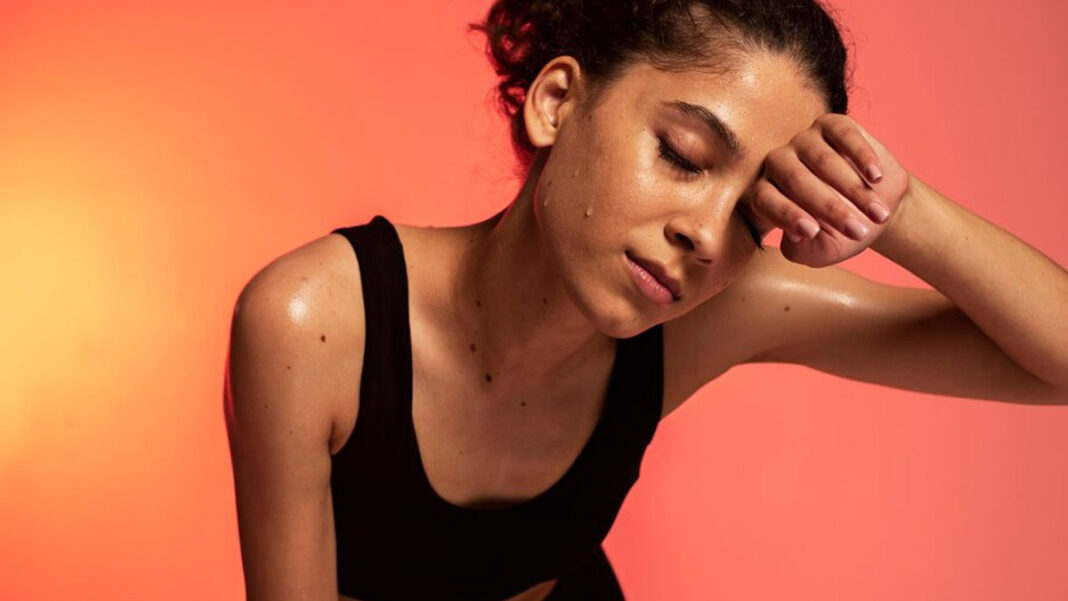Sweating, or perspiration, is a natural response to many factors, including high temperatures and extreme heat. It is a way to help regulate the body temperature, wherein the sweat glands in the skin release salt-based fluid. In general, sweating helps cool us down. It removes toxins and even improves circulation in the body. What’s more, it can act as a double-edged sword for your skin. How? In this article, we will learn about it all. How Sweating Impacts Skin Health In an interaction with the OnlyMyHealth team, Dr Sachin Gupta, Consultant Dermatologist, Amrita Hospital, Faridabad, explains, “Sweating helps regulate body temperature through the release of fluids from sweat glands. Its main function is to cool the body, but it also has implications for skin health.” Also Read: Excessive Sweating: Causes And Treatment According to the doctor, sweating helps to expel oils, dirt, and impurities from pores, which can prevent clogging and reduce acne formation. It also temporarily increases skin hydration, giving it a fresh appearance. However, excessive sweating can cause irritation of the skin and increase the risk of fungal and bacterial infections if not taken care of. This is particularly true for people with sensitive skin, Dr Gupta notes. Does Sweating Prevent Or Cause Acne? Interestingly, sweating has a dual relationship with acne, says Dr Gupta, adding that it can both help prevent and potentially cause it, depending on the circumstances. She explains, “On the one hand, mild to moderate sweating helps in the prevention of acne by cleaning pores and removing excessive oils. However, excessive sweating, if not washed off properly, especially tight clothing, can exacerbate acne. This can happen as sweat mixed with bacteria and debris can lead to blocked pores and inflammation of lesions.” A 2023 review published in the Anais Brasileiros De Dermatologia suggested that excessive sweating can trap dirt and oil, clog pores, and irritate the skin, potentially leading to breakouts. However, the study also acknowledged the presence of dermcidin, which fights off the germs and does not allow acne-causing bacteria to thrive. Therefore, the bottom line is that more research is needed to definitively say if excessive sweating directly causes acne or not. However, it’s possible that sweating can worsen existing acne, especially if proper hygiene isn’t maintained after sweating. Other Causes Of Acne Generally, acne occurs due to the blockage and inflammation of sebaceous glands, says Dr Gupta. She explains that this blockage typically results from excess sebum production, the accumulation of dead skin cells, and bacterial colonisation, particularly by Propionibacterium acnes. Many factors, ranging from hormonal fluctuations, especially during puberty, pregnancy, or hormonal disorders, can increase sebum production and lead to acne. According to the doctor, the buildup of oil and dead skin cells can result in further clogging of the pores. Moreover, diet also plays a role in acne. The doctor says, “High-glycemic foods, dairy products, and whey proteins can exacerbate acne in susceptible individuals.” Not to mention stress, which can lead to an increase in the production of hormones such as cortisol, which can worsen acne. Also Read: Skincare Ingredients For Acne-Prone Skin: Here’s What To Look For In A Face Wash, Serum, And Moisturiser Skin-Care Tips For People Who Sweat Profusely If you’re someone who sweats excessively, a few tips may help you manage your skin health. These include: Regularly wash your face and body with a gentle cleanser to remove sweat and prevent clogging of pores. Always choose skincare and makeup products labelled as ‘non-comedogenic,’ as these products won’t block your pores. Wearing loose, breathable fabrics like cotton, which can minimise skin irritation and allow sweat to evaporate more quickly. Drink plenty of water to stay hydrated. Always shower and change out of sweaty clothes as soon as you can to prevent any sweat from sitting on your skin and causing irritation or breakouts. Conclusion Sweating is a great way to help cool off your body. However, if you sweat too much, it is important to simultaneously maintain proper hydration and hygiene. Since you’re losing a lot of fluid from your body, you must maintain hydration levels. On the other hand, you must also bathe and change your clothing to avoid germs and bacteria thriving on your skin, which can lead to clogged pores, acne formation, and even skin infection. You can also be in touch with a skin specialist to frequently assess your skin and understand what works best for it.Read NextSuffering From Heat Rash? How To Spot It And What To Do Disclaimer All possible measures have been taken to ensure accuracy, reliability, timeliness and authenticity of the information; however Onlymyhealth.com does not take any liability for the same. Using any information provided by the website is solely at the viewers’ discretion. In case of any medical exigencies/ persistent health issues, we advise you to seek a qualified medical practitioner before putting to use any advice/tips given by our team or any third party in form of answers/comments on the above mentioned website.
